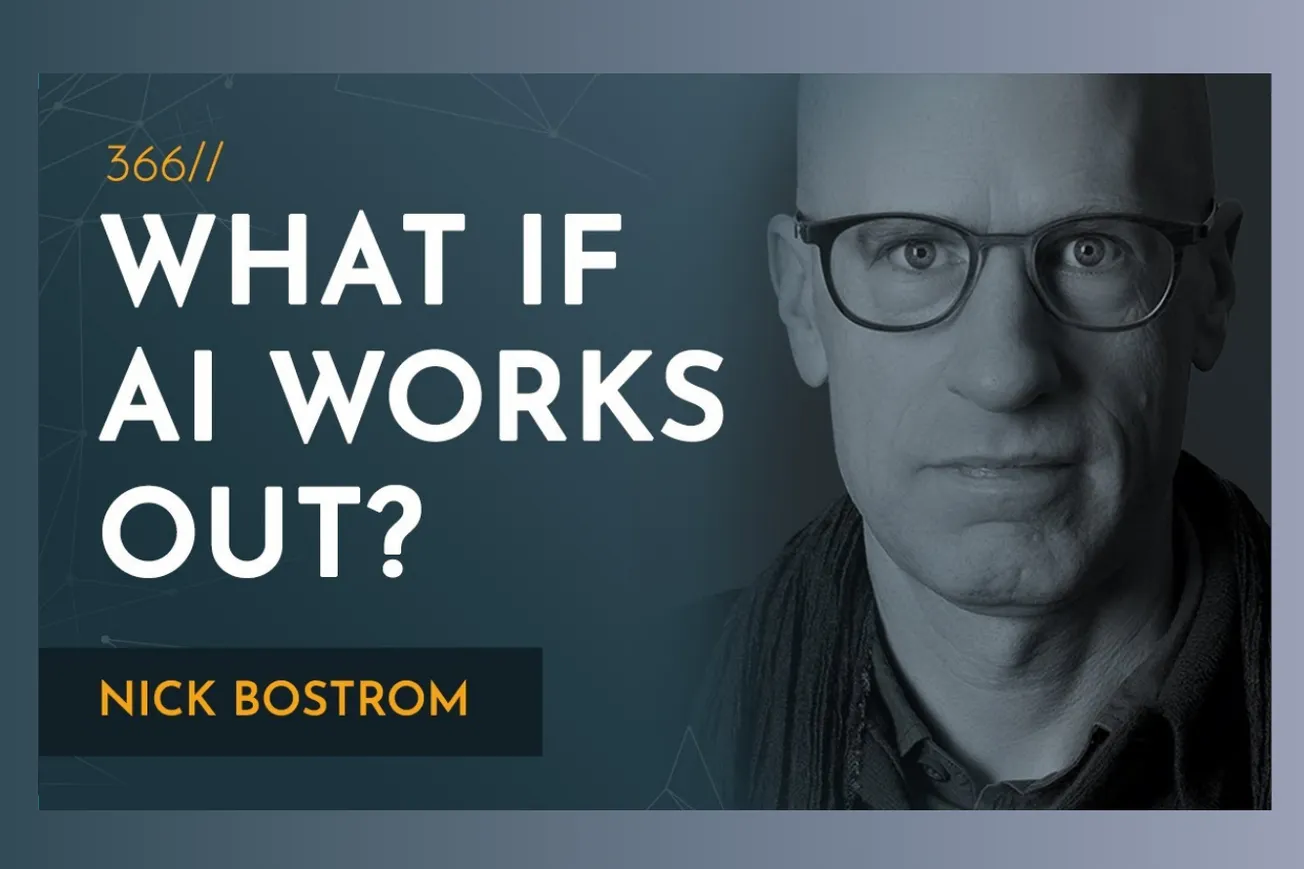Table of Contents
Philosopher Nick Bostrom explores what happens when artificial intelligence solves all practical problems, leaving humanity to confront fundamental questions about purpose, meaning, and the value of human existence in a post-instrumental world.
Nick Bostrom's latest work examines the philosophical implications of achieving technological maturity through superintelligence, where the primary challenges become existential rather than practical, forcing humanity to reconsider the foundations of meaning and purpose.
Key Takeaways
- A "solved world" combines technological maturity with governance solutions, creating conditions where practical problems either disappear or are more efficiently handled by AI systems
- The transition from symbolic AI to deep learning neural networks has accelerated progress faster than many experts predicted, putting us potentially in the fastest 25% of scenarios
- AI development raises questions about centralization versus decentralization of power, with technology potentially enabling both greater control and greater democratic participation
- The "post-instrumental condition" emerges when AI can perform not just economic tasks but all activities humans do for practical benefits, including exercise, learning, and even social interaction
- Traditional sources of meaning—work, problem-solving, skill development—may become obsolete when machines can perform these functions more efficiently than humans
- The "purpose problem" represents the core challenge of technological maturity: determining what makes life worth living when external constraints and necessities disappear
- Educational and economic systems face fundamental disruption as AI capabilities expand beyond narrow domains into general intelligence applications
- Questions about human agency, authentic experience, and contact with reality become paramount when virtual alternatives may provide superior outcomes
Timeline Overview
- From Superintelligence to Deep Utopia — Evolution of AI Philosophy: Bostrom's journey from examining AI risks to exploring post-scarcity philosophical implications when everything goes right
- The Deep Learning Revolution — Technical Transformation: How neural networks replaced symbolic reasoning, accelerating AI progress through GPU computing and unsupervised learning techniques
- Technological Maturity Predictions — Timeline Scenarios: Estimates for achieving human-level AGI, superintelligence, and the subsequent rapid development of advanced technologies
- Political Implications of AI Power — Centralization vs Decentralization: Analysis of how AI tools could either concentrate authority or enable broader democratic participation
- The End of Work and Education — Institutional Disruption: Examining how AI automation affects employment, learning systems, and traditional educational structures
- Post-Instrumental Living Conditions — Beyond Practical Necessity: Exploring life when AI handles all instrumental tasks, from shopping to exercise to social coordination
- The Purpose Problem — Existential Meaning Crisis: Confronting fundamental questions about human value and significance in a world without external constraints or necessities
- Navigating Transition Challenges — Practical Advice: Recommendations for individuals facing uncertainty about careers, education, and life direction amid rapid technological change
Defining the Solved World: Technological Maturity and Governance Solutions
Bostrom's concept of a "solved world" represents a convergence of two critical achievements that would fundamentally transform human existence and the challenges we face daily.
- Technological maturity means developing all technologies that are physically possible and for which developmental pathways exist from our current capabilities
- This includes advanced AI systems, comprehensive robotics, cures for aging, brain uploading capabilities, nanotechnology, and space settlement infrastructure
- Governance problems would be solved to the extent possible, implementing optimal political systems and institutional arrangements for human flourishing
- The combination eliminates most practical problems that humans currently struggle with, either by making them disappear or by enabling AI systems to solve them more efficiently
- Unlike utopian fantasies, this scenario doesn't require violating physical laws or achieving impossible perfection, but rather represents the logical endpoint of technological development
- The timeframe remains uncertain but could potentially occur within decades if superintelligence emerges and accelerates research across all technological domains
- This differs from dystopian scenarios by assuming successful resolution of AI alignment and governance challenges that currently concern researchers
The solved world concept forces consideration of what human existence means when external pressures and practical necessities no longer shape daily life, creating unprecedented philosophical challenges about purpose and meaning.
The Deep Learning Revolution and Accelerating AI Progress
The transformation from symbolic AI to neural network approaches represents a fundamental shift that has exceeded many expert predictions about the pace of artificial intelligence development.
- Traditional AI relied on explicitly programmed rules, symbolic reasoning, and handcrafted databases of facts, creating systems that were logically sophisticated but brittle and narrow
- The deep learning revolution began around 2010-2012 when GPU hardware originally designed for video games enabled training of much larger neural networks
- Neural networks learn through gradient descent, adjusting billions of connection weights based on training data rather than following predetermined logical rules
- Unsupervised learning allows AI systems to train on vast amounts of internet text by learning to predict missing words, requiring minimal human supervision
- This approach has proven remarkably effective across diverse domains, from image recognition and game-playing to natural language understanding and generation
- Progress has been "on the shorter end of the distribution" compared to Bostrom's 2014 predictions, likely in the fastest 25% of probability scenarios
- Major breakthroughs like AlphaGo defeating human champions and large language models achieving conversational abilities have demonstrated AI's potential for superhuman performance
The acceleration suggests that human-level artificial general intelligence could arrive sooner than many anticipated, making questions about post-AGI society increasingly urgent rather than purely theoretical.
Political Implications: Centralization, Decentralization, and Democratic Control
The development of advanced AI systems raises fundamental questions about power distribution and governance that could reshape political arrangements in unpredictable ways.
- Historical communication technologies have generally been decentralizing forces, from the printing press enabling religious reformation to the internet facilitating information access
- AI technologies could simultaneously enable greater centralization and greater decentralization, depending on how they are implemented and regulated
- Centralization risks include automated surveillance systems, individualized propaganda, and the ability for small governing coalitions to maintain control without broader consent
- AI could enable dictatorships to function with minimal human support through automated security forces and granular monitoring of citizen behavior and sentiment
- Decentralization possibilities include AI representatives advocating for individual citizens, enhanced ability to scrutinize government actions, and more sophisticated democratic participation
- The outcome likely depends on which political equilibria emerge rather than being technologically determined, with both authoritarian and democratic scenarios possible
- Citizens could potentially have AI assistants that continuously engage with legislative processes and policy debates on their behalf, democratizing political participation
The ultimate political impact will likely depend on conscious choices about institutional design and regulation rather than emerging automatically from technological capabilities alone.
The Transformation of Work, Education, and Human Purpose
AI's progression toward automating all functionally defined tasks fundamentally challenges traditional assumptions about work, learning, and human contribution to society.
- The goal of AI development has always been "full unemployment" - automating all tasks that humans currently perform for economic purposes
- Most jobs will become obsolete as AI systems can perform them more efficiently, cheaply, and reliably than humans can
- Exceptions will exist where consumers specifically prefer human production methods, such as artisanal goods, live performances, or services with interpersonal meaning
- Educational institutions face disruption as AI tutors become available that can provide individualized instruction superior to classroom-based approaches
- Current educational systems may seem as barbaric to future generations as we now view historical practices like slavery or denying women education
- Students could already cover entire curricula using tools like ChatGPT, Khan Academy, and Google, making traditional classroom instruction increasingly obsolete
- The challenge becomes determining what human development and learning mean when AI can provide better instruction and assessment than human teachers
These changes raise profound questions about human identity and purpose when traditional roles in economic production and knowledge transmission become unnecessary.
The Post-Instrumental Condition and the Purpose Problem
As AI capabilities expand beyond economic tasks into all areas of human activity, society may face a fundamental crisis about what activities remain meaningful for humans to pursue.
- The "post-instrumental condition" emerges when AI can perform not just work but all activities humans currently do for practical benefits
- This includes shopping (AI recommenders make better choices), exercise (pills could provide the same fitness benefits), and even social coordination
- Bostrom uses the metaphor of insects with exoskeletons: humans have an "exoskeleton of instrumental necessities" that gives structure to daily life
- Removing these external constraints could leave human existence shapeless, like an insect without its protective shell
- Even activities people do for pleasure could become questionable if AI can provide the same psychological rewards more efficiently through direct stimulation
- The "plasticity" of future technology could make our bodies and minds completely malleable, allowing shortcuts to any desired mental or physical state
- This creates the fundamental "purpose problem": what constitutes a meaningful life when all external goals can be achieved more efficiently by machines
The challenge is determining what remains authentically valuable about human experience when technological solutions can optimize all outcomes more effectively.
Games, Competition, and Social Meaning in Automated Societies
As practical necessities disappear, activities involving human competition, creativity, and social interaction may become increasingly central to meaningful existence.
- Games and sports could become more important as domains where humans compete with other humans rather than trying to match machine performance
- This parallels how chess and video games remain popular despite AI superiority, because human vs. human competition provides different satisfactions than human vs. machine contests
- Social interaction may become more valuable as one of the few domains where human participation is preferred over AI alternatives
- However, the development of sophisticated AI companions raises questions about whether humans will choose to interact with other flawed humans over optimized virtual relationships
- The preference for human social connection may be generational, with older people valuing "real" relationships while younger generations embrace AI companions
- Virtual relationships could provide more consistent emotional rewards than the "mixed bag" of human personalities with their good and bad qualities
- The relative importance of authentic versus optimized experiences becomes a crucial value question for future societies
Whether humans will choose authentic but imperfect human relationships over highly satisfying AI relationships remains an open question with significant implications for social structure.
Navigating Reality, Authenticity, and Human Values
The prospect of technological solutions to all human problems forces consideration of fundamental questions about what makes life worth living and what constitutes authentic experience.
- The question of contact with "reality" becomes complex when cultural artifacts, human institutions, and social constructions are also part of reality
- Most human life already takes place within socially constructed rather than "natural" environments, from buildings and books to financial systems and legal frameworks
- Technological solutions might not be inherently inferior to "natural" approaches, though questions remain about what forms of human flourishing they enable or prevent
- The simulation hypothesis adds another layer of uncertainty: if we're already in a simulation, questions about authentic versus artificial experience become even more complex
- Historical transitions from hunter-gatherer to agricultural to industrial societies involved similar concerns about losing essential human characteristics
- Each transition created new forms of meaning and value while eliminating others, suggesting adaptation to post-industrial conditions might be possible
- The speed of current changes may be more challenging than the absolute magnitude, as rapid transitions can cause social disruption even when long-term outcomes are positive
The core challenge is developing wisdom about which human values and experiences are worth preserving versus which constraints we should gladly abandon.
Common Questions
Q: How long until we reach technological maturity?
A: Bostrom estimates it could happen months to decades after achieving superintelligence, which itself may arrive within the fastest 25% of scenarios from his 2014 predictions.
Q: Will AI lead to political centralization or decentralization?
A: Both are possible - AI could enable authoritarian control through surveillance and automated enforcement, or democratic participation through AI representatives and enhanced government oversight.
Q: What happens to education when AI can teach better than humans?
A: Individual learning could become highly personalized and efficient, though institutional change may lag behind technological capabilities due to social inertia.
Q: How do we find meaning when machines can do everything better?
A: The "purpose problem" requires rethinking values from first principles, potentially focusing on experiences, relationships, and activities valued for their own sake rather than their outcomes.
Q: Should we be concerned about losing touch with reality?
A: This depends on how we define reality and authenticity - cultural constructions and technological solutions are also part of reality, though questions about human flourishing remain important.
The prospect of a solved world represents both humanity's greatest opportunity and its most profound philosophical challenge. While technological maturity could eliminate suffering, scarcity, and practical constraints, it also forces confrontation with fundamental questions about purpose, meaning, and the value of human existence that we have historically avoided through the necessity of survival and problem-solving.
Nick Bostrom's exploration of the "solved world" reveals a paradox at the heart of technological progress: success in eliminating external constraints and practical problems may create existential challenges more profound than any humanity has previously faced. The transition from a world of scarcity and struggle to one of abundance and automation represents not just technological change but a fundamental transformation in what it means to be human.
Practical Implications
- Embrace uncertainty while preparing for multiple scenarios - hedge bets by learning fundamental skills while staying current with AI developments and potentially investing in relevant technologies
- Focus on present experience rather than deferring fulfillment - given uncertainty about how quickly changes will occur, prioritize enjoying human existence now rather than waiting for future achievements
- Develop familiarity with AI tools early - become an early adopter to gain advantages during the transition period while these technologies are still developing
- Cultivate relationships and experiences unique to human connection - invest in social bonds and activities that derive value from human participation rather than optimized outcomes
- Question fundamental assumptions about work, education, and purpose - begin thinking now about what gives life meaning beyond traditional career and achievement structures
- Stay informed about AI development and policy - this represents the "main show in town" for understanding how the future will unfold
- Consider the speed of change in personal and career planning - rapid technological advancement may require more flexible and adaptable approaches than previous generations needed
- Explore philosophical questions about values and meaning - develop perspectives on what makes life worth living that don't depend entirely on external necessities and constraints
- Maintain perspective on historical uniqueness - recognize we may be living through the most consequential period in human history and pay appropriate attention to developments
- Prepare for potential social disruption - rapid changes could create challenges similar to historical cultural transitions, requiring resilience and adaptability





